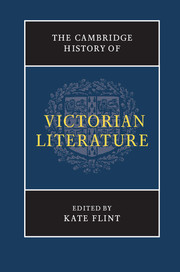Book contents
- Frontmatter
- Introduction
- PART I AUTHORS, READERS, AND PUBLISHERS
- PART II WRITING VICTORIA’s ENGLAND
- PART III MODES OF WRITING
- 7 Lyric and the lyrical
- 8 Epic
- 9 Melodrama
- 10 Sensation
- 11 Autobiography
- 12 Comic and satirical
- 13 Innovation and experiment
- 14 Writing for children
- PART IV MATTERS OF DEBATE
- PART V SPACES OF WRITING
- PART VI VICTORIAN AFTERLIVES
- Select bibliography
- Index
13 - Innovation and experiment
from PART III - MODES OF WRITING
Published online by Cambridge University Press: 28 March 2012
- Frontmatter
- Introduction
- PART I AUTHORS, READERS, AND PUBLISHERS
- PART II WRITING VICTORIA’s ENGLAND
- PART III MODES OF WRITING
- 7 Lyric and the lyrical
- 8 Epic
- 9 Melodrama
- 10 Sensation
- 11 Autobiography
- 12 Comic and satirical
- 13 Innovation and experiment
- 14 Writing for children
- PART IV MATTERS OF DEBATE
- PART V SPACES OF WRITING
- PART VI VICTORIAN AFTERLIVES
- Select bibliography
- Index
Summary
Viewed in a perspective of innovation and experiment, few cultural periods have been more inadequately represented by twentieth-century critics and scholars than the age of Victoria. A nation of shopkeepers ruled by a dismal science and proud of its vulgar spirit of commonplace proprieties: the word ‘Victorian’ still carries such overtones, and not without reason. So how could one expect any adventurous aesthetic practices to emerge from such a world?
That question, that situation, was a central preoccupation for the Victorians themselves, and their responses produced one of the most fruitful periods of aesthetic innovation in British history. If Victorian commercial enterprise underwrote many of these innovations, as it did, many others emerged as acts of critical response to the age’s prevalent complacencies.
Between the death of Lord Byron (1824) and the death of Algernon Swinburne (1909) – two of England’s greatest literary innovators – a spirit of practical invention powered every part of the British empire, not least of all those sectors devoted to literature. This was an age of great publishing entrepreneurs. Aided partly by innovative business methods and partly by remarkable advances in papermaking, printing, the graphic arts, and communication networks, the many new commercial schemes and projects forced writers to rethink and re-invent their writing practices, often in very direct ways.
- Type
- Chapter
- Information
- The Cambridge History of Victorian Literature , pp. 288 - 310Publisher: Cambridge University PressPrint publication year: 2012



